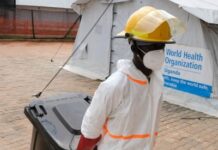Bruno Lemarquis, Deputy Special Representative and Humanitarian Coordinator for the DRC, updated journalists on latest developments and obstacles to aid delivery, which include loss of critical supplies to looting and the impact of the decision by the United States to suspend billions in foreign aid.
A displaced family sit in front of their makeshift shelter in Goma, North Kivu province, DR Congo.
Lack of services
Meanwhile, many people in Goma are still facing difficult humanitarian conditions. Essential services, particularly water and electricity, are not yet fully operational. As a result, many are using water directly from Lake Kivu, thus increasing the risk of contracting waterborne diseases.
Mr. Lemarquis noted, however, that things have improved slightly as efforts are underway to restore electricity and to re-establish the water supply. School activities have partially resumed after a two-week suspension due to the fighting, though many teachers remain uncertain about their status and pay under the new de facto authorities.
Public services also remain partially functional in Goma, with a limited number of civil servants having returned to work because of the uncertainty, but hospitals are still overwhelmed.
“Mortuaries are saturated, and medical teams have to cope with an unprecedented number of war wounded, with a shortage of medicine and medical supplies,” he said.
“Risks of epidemics are high in the city, in particular cholera and mpox. Food prices have risen, and more and more people need food assistance every day.”
Commitment to stay
Against this complex backdrop, humanitarian partners remain on the ground working to prevent and alleviate suffering, he said. They are also moving to strengthen response now that the situation has stabilized, and several colleagues who were evacuated or relocated will be brought back.
However, some key challenges remain. Mr. Lemarquis said many facilities belonging to the UN and international aid agencies were looted during the height of the fighting in Goma, and millions of dollars in supplies were lost.
Getting aid to Goma is another major obstacle as the airport there remains closed and non-operational.
“Without this airport we cannot evacuate the seriously injured, transport the necessary medical supplies or bring in humanitarian reinforcement,” he said. “All parties must act now to work together to re-open the airport and allow humanitarian flights to resume.”
A ‘new reality’
Humanitarians are also affected by the “new reality in Goma” as they navigate customs and border-related issues, while their final challenge concerns the Trump administration’s decision to temporarily suspend foreign aid.
“This is a major source of concern with several UN agencies and international NGOs active on the ground having seen their operations at best severely impact, if not halted,” he said.
“Our humanitarian response is the most dependent in the world on US assistance. We were 70 per cent funded by US funding, so this is having major impact.”
US aid cuts
In response to a journalist’s question, Mr. Lemarquis explained that humanitarians required $2.5 billion for their operations in 2024 and garnered $1.3 billion – the highest amount ever received in the DRC for humanitarian response. Of the total, $910 million came from the US alone.
“The ultra-dependence on US funding means a lot of programmes had to shut down on everything we are doing. So, it’s emergency health, it’s emergency shelter…it’s coordination capacity,” he said.
“The only exception so far, but we hope there will be more exceptions, was emergency food assistance.”
Appeal for international support
Yet “despite these challenges, we aim to stay and deliver,” said Mr. Lemarquis.
On behalf of the humanitarian community, he reiterated the call for “all the parties to end hostilities and to return to the political process.”
He also urged the international community “to intensify its support for the humanitarian response in this complicated area.”





























